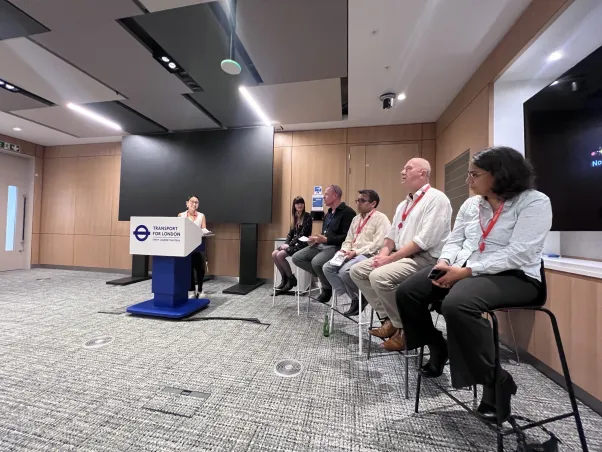Designing for Dignity: Lessons from the TPS Enabling Access for All Event

What does it take to build a transport system that works for everyone? On July 30th, the Transport Planning Society in partnership with CILT and CIHT gathered voices from across the sector to explore that question in person at the TfL Headquarters in Stratford, London as well as online.
The event was a call to action, centring on key four themes: inclusive design, lived experience, co-cultivation, and systemic change.
Inclusive design: more than infrastructure
“Infrastructure is not just about concrete and steel, it’s about building a London where no one is left behind; giving people what they need to travel safely and confidently”, said Joely Hill, Board Member at TPS and Principal Technical Planner at TfL, opening the event with TfL’s Plan “Equity in Motion”.
Design was repeatedly framed as a form of communication. Fern Lulham, broadcaster, public speaker and disability awareness trainer, was the inspiring keynote speaker of the evening and reminded us:
“Design communicates. It says something to everyone who moves on and through it. And what it says can either empower and enable or restrict and oppress.”
From tactile paving to audio announcements, inclusive design isn’t a checklist, it’s a commitment to dignity, independence, and belonging. As Dr. Kush Kanodia, Accessibility Advocate and member of TfL’s Independent Disability Advisory Group, put it:
“If it’s not accessible, it should be rejected.”
Lived experience: the human perspective
Speakers reminded us that accessibility is not theoretical, it’s deeply personal. Fern Lulham shared how navigating transport as a blind person often means relying on systems that weren’t built with her in mind. She described moments of exclusion, but also the power of thoughtful design:
“Even if you lose all of your sight, you can still be part of the world. There will always be a seat saved for you here.”
Michael Barratt MBE, Construction Advisory and Innovations Manager at TfL and EDI advocate at CIHT echoed this, describing how his work evolved by listening to real people:
“We’re not experts, we’re always learning. And the best way to learn is to listen.”
These stories again highlighted how design choices shape not just movement, but dignity.
Co-cultivation: designing with, not for
A term that resonated throughout the evening was co-cultivation, introduced by CIHT’s Antoneta Horbury and inspired by Professor Nick Tyler. It goes beyond consultation, it’s about involving people with lived experience from the very beginning and throughout the lifecycle of a project. Antoneta also highlighted the importance of meaningful early engagement to account for underrepresented groups:
“Transport planners use existing data as a future model of what future data will be. But the point is, if you can't even access the area now, you're not going to be included in the existing data. So, you need to, at the very early stage, know what our data includes, but also what it doesn’t.”
Clive Wood, Lead Regional Policy and Campaigns Manager at Guide Dogs UK echoed that disabled voices must be central throughout this process:
“Nothing about us without us.”
Systemic change: from policy to practice
Liani Baglietto Castellares, TPS board member, EDI advocate at CIHT and event host, reminded attendees that transport systems can either reinforce or redress inequality, but that the latter requires of an approach that not only records but meaningfully includes diverse voices in both data and decision-making, and that considers the whole-journey:
“Achieving equity requires us to critically assess fairness at every stage”
The event didn’t shy away from the bigger picture. Dr. Kanodia challenged the audience to rethink accessibility not as a cost, but as an investment, with over £70 billion in potential socioeconomic benefit if the transport accessibility gap were closed:
“We will all experience disability in some shape or form in the future. An accessible transport system is one of the greatest free insurance policies we can give our families.”
Fern added a powerful reminder about enforcement:
“We have laws. But when they’re not followed, it’s on the individual to fight. That’s not justice.”
Final remarks: accessibility as a human right
Dr. Kush challenged us all: “What’s your legacy?”
Reminding us that whether we’re planners, designers, policymakers, or commuters, we all have a role in shaping transport systems that connect not just places, but people. As mentioned by Antoneta Horbury, disability awareness should be mandatory training, and it should be continuously refreshed.
We closed the event concluding that accessibility should not be “nice to have”, we should treat it as a human right. The TPS Accessibility Event reminded us that inclusive transport is achievable, but only if we embed lived experience, challenge outdated systems, and design with empathy.
We thank our speakers for their participation at this event and their continuous commitment to enabling access for all.
You can read more about their work below:
· Creating a public realm for all | CIHT







